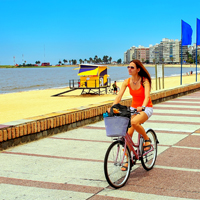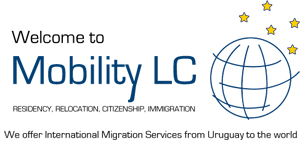Real Estate in Montevideo, Uruguay
Last updated on Jan 11, 2025
Summary: Expats and retirees talk about real estate in Montevideo, Uruguay? How do you find a home in Montevideo? Should you buy or rent? What is the cost of housing?
How do I find a place to live in Montevideo?
We asked expats how they chose their neighborhood and found a place to live. They answered:
"Finding a place to live in Montevideo involves several steps. First, you need to determine your budget and the type of accommodation you're looking for. This could range from a small apartment to a larger house, depending on your needs and financial situation. Next, you should research the different neighborhoods in Montevideo to find one that suits your lifestyle and preferences. Some popular areas include Pocitos, Punta Carretas, and Carrasco. Each neighborhood has its own unique character and amenities, so it's important to visit them in person if possible. Once you've identified a few potential neighborhoods, you can start looking for specific properties. There are several online platforms where you can find listings for rentals or properties for sale in Montevideo, such as Mercado Libre, Infocasas, and Gallito. These websites allow you to filter results based on your preferences, such as the number of bedrooms, price range, and location. In addition to online listings, you might also consider hiring a real estate agent. They can provide valuable local knowledge and help you navigate the process of finding and securing a place to live. When you find a property you're interested in, it's important to visit it in person before making a decision. This will give you a chance to inspect the property, check out the surrounding area, and ask any questions you might have. Finally, once you've found a place you like, you'll need to negotiate the terms of the lease or purchase agreement. This will typically involve providing some form of identification, proof of income, and possibly a security deposit. It's advisable to have a lawyer review any contracts before you sign them to ensure your interests are protected. Remember, finding a place to live in a new city can take time, so it's important to be patient and thorough in your search," said one expat in Montevideo.
 Mobility LC
Mobility LCConnect
Mobility LC is committed to work hard to make your Uruguayan immigration and relocation process a reality. We can provide you with the best local contacts and will guide you all the way through the process offering support in 5 different languages. Your success is our personal goal.
Click connect to have our partner contact you via e-mail and/or phone.
 Mobility LC
Mobility LCMobility LC is committed to work hard to make your Uruguayan immigration and relocation process a reality. We can provide you with the best local contacts and will guide you all the way through the process offering support in 5 different languages. Your success is our personal goal.
Connect
Click connect to have our partner contact you via e-mail and/or phone.
What is a typical expat home or apartment like in Montevideo?
"A typical expat home or apartment in Montevideo, is often located in safe, upscale neighborhoods such as Pocitos, Punta Carretas, or Carrasco. These homes are usually modern and spacious, with a blend of contemporary and traditional Uruguayan architecture. They often feature large windows that let in plenty of natural light, and balconies or terraces that offer views of the city or the Rio de la Plata. The interiors are typically well-appointed, with modern kitchens equipped with up-to-date appliances. The living areas are often open-plan, with plenty of space for dining and entertaining. Bedrooms are usually large and comfortable, with ample storage space. Many homes also have home offices, reflecting the increasing trend of remote work among expats. In terms of amenities, many expat apartments in Montevideo come with access to a communal swimming pool, gym, and sometimes even a sauna or spa. Some buildings also offer 24-hour security services, which adds an extra layer of safety for residents. Despite being in the city, it's not uncommon for these homes to be close to green spaces, such as parks or even the beach, providing opportunities for outdoor activities. They are also usually within easy reach of supermarkets, restaurants, cafes, and other conveniences, making daily life easier for expats. In terms of decor, many expats choose to incorporate elements of Uruguayan culture into their homes, such as local artwork or traditional textiles. However, the overall aesthetic tends to be quite international, reflecting the diverse backgrounds of the expat community in Montevideo," remarked one member in Montevideo.

Mobility LC is committed to work hard to make your Uruguayan immigration and relocation process a reality. We can provide you with the best local contacts and will guide you all the way through the process offering support in 5 different languages. Your success is our personal goal.
Click connect to have our partner contact you via e-mail and/or phone.

Mobility LC is committed to work hard to make your Uruguayan immigration and relocation process a reality. We can provide you with the best local contacts and will guide you all the way through the process offering support in 5 different languages. Your success is our personal goal.
Click connect to have our partner contact you via e-mail and/or phone.
What is the average cost of housing in Montevideo?
If you are thinking about moving to Montevideo, cost of living in probably a key consideration. Expats commented about the cost of housing:
"The average cost of housing in Montevideo can vary greatly depending on the location and size of the property. For instance, in the city center, a one-bedroom apartment may cost around $500 to $700 per month, while a three-bedroom apartment can range from $800 to $1,200 per month. Outside the city center, the prices can drop significantly, with a one-bedroom apartment costing around $350 to $500 per month and a three-bedroom apartment ranging from $600 to $900 per month. If you're looking to buy property, the price per square meter in the city center can be around $2,500 to $3,500, while outside the city center it can be around $1,500 to $2,500. However, these prices can fluctuate based on market conditions and other factors," said one expat in Montevideo.
Should I buy or rent a home in Montevideo?
If you have not spent a lot of time in Montevideo, you should rent before even thinking about buying. We asked expats there about the buy vs. rent decision:
"The decision to buy or rent a home in Montevideo, largely depends on your personal circumstances, financial situation, and long-term plans. If you plan to stay in Montevideo for a long period, buying a home could be a good investment. Owning a home allows you to build equity over time and could provide financial stability in the long run. However, buying a home also comes with significant upfront costs, including a down payment, closing costs, and potential renovation expenses. It also requires a long-term commitment, as selling a home can take time and effort. If you're not sure about your long-term plans or if you prefer not to deal with maintenance and other homeowner responsibilities, renting might be a better option for you. Renting a home in Montevideo offers more flexibility. It's a good option if you're planning to stay for a short period or if you're still exploring different neighborhoods before settling down. Renting also means you won't have to worry about maintenance costs or property taxes, as these are typically covered by the landlord. However, renting doesn't build equity and rental rates can increase over time. You also have less control over your living situation, as landlords can decide to sell the property or not renew your lease. In conclusion, both buying and renting a home in Montevideo have their pros and cons. It's important to consider your financial situation, lifestyle, and long-term plans before making a decision. Consulting with a real estate professional or financial advisor can also provide valuable insights tailored to your specific situation," remarked one foreigner who made the move to Montevideo.
About the Author
 Joshua Wood, LPC joined Expat Exchange in 2000 and serves as one of its Co-Presidents. He is also one of the Founders of Digital Nomad Exchange. Prior to Expat Exchange, Joshua worked for NBC Cable (MSNBC and CNBC
Primetime). Joshua has a BA from Syracuse and a Master's in Clinical and Counseling Psychology from Fairleigh Dickinson University. Mr. Wood is also a licensed counselor and psychotherapist.
Joshua Wood, LPC joined Expat Exchange in 2000 and serves as one of its Co-Presidents. He is also one of the Founders of Digital Nomad Exchange. Prior to Expat Exchange, Joshua worked for NBC Cable (MSNBC and CNBC
Primetime). Joshua has a BA from Syracuse and a Master's in Clinical and Counseling Psychology from Fairleigh Dickinson University. Mr. Wood is also a licensed counselor and psychotherapist.
Some of Joshua's articles include Pros and Cons of Living in Portugal, 10 Best Places to Live in Ireland and Pros and Cons of Living in Uruguay. Connect with Joshua on LinkedIn.
Additional Information:
- Expat Guide to Montevideo
- Driving in Montevideo
- Health Care in Montevideo
- Discover the Best of Montevideo
- Cost of Living in Montevideo
- Healthcare & Health Insurance in Uruguay
- Best Places to Live in Uruguay
- How to Enroll Your Children in School in Uruguay
- Pros and Cons of Living in Uruguay 2025
- 2025 Guide to Moving to Uruguay

 Montevideo, Uruguay
Montevideo, Uruguay


